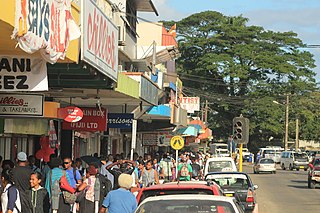The Southern Division Kisan Sangh was formed in Fiji in 1946 by a former member of parliament, K. B. Singh, due to personal differences with the president of the Rewa Planters Union, Ram Krishna Chaudhary. There was widespread opposition to this until Vishnu Deo took over its leadership and worked together with Ram Krishna Chaudhary and his union.

Fiji, officially the Republic of Fiji, is an island country in Melanesia, part of Oceania in the South Pacific Ocean about 1,100 nautical miles northeast of New Zealand's North Island. Its closest neighbours are Vanuatu to the west, New Caledonia to the southwest, New Zealand's Kermadec Islands to the southeast, Tonga to the east, the Samoas and France's Wallis and Futuna to the northeast, and Tuvalu to the north. Fiji consists of an archipelago of more than 330 islands—of which 110 are permanently inhabited—and more than 500 islets, amounting to a total land area of about 18,300 square kilometres (7,100 sq mi). The most outlying island is Ono-i-Lau. The two major islands, Viti Levu and Vanua Levu, account for 87% of the total population of 898,760. The capital, Suva, on Viti Levu, serves as the country's principal cruise-ship port. About three-quarters of Fijians live on Viti Levu's coasts, either in Suva or in smaller urban centres such as Nadi—where tourism is the major local industry—or Lautoka, where the sugar-cane industry is paramount. Due to its terrain, the interior of Viti Levu is sparsely inhabited.
Kunwar Bachint Singh was an Indo-Fijian politician. He arrived in Fiji in 1927 as a teacher for the Arya Samaj but his association with Vishnu Deo led him to play an active role in aggressively promoting the Arya Samaj and finally into politics. He was elected into the Legislative Council as a protégé of Vishnu Deo but after the election took an independent stance opposed to the wishes of the majority of the Indo-Fijians. He supported nominated rather than elected representation, actively supported the war effort and even attempted to set up a farmers union opposed to a number of existing unions. The Government rewarded him for his loyalty by nominating him into the Legislative Council three times, appointing him as a Justice of the Peace and as a member of the Executive Council.
Rewa Planters Union was formed on 14 July 1943 at a meeting attended by 1500 cane farmers from Rewa Province, Fiji. The union was formed in reaction to the strike of cane farmers taking place in the Western Division. The government had appointed a commission to inquire into the farmers' grievances and the Rewa farmers wanted to send a representative to it. The union was led by Ram Krishna Chaudhary with Faiz Mohammed as Secretary.
In 1948, Vishnu Deo and A. D. Patel parted ways after having worked together since 1929 and this affected the sugarcane industry as Vishnu Deo aligned himself with Ayodhya Prasad and the Kisan Sangh and was opposed to A.D. Patel's Maha Sangh.
Ambalal Dahyabhai Patel, better known as A.D. Patel (1905–1969), was a Fiji Indian politician, farmers' leader and founder and leader of the National Federation Party. Patel was uncompromisingly committed to a vision of an independent Fiji, with full racial integration. He was one of the first to advocate a republic, an ideal not realized in his lifetime. He also advocated a common voters' roll and opposed the communal franchise that characterized Fijian politics.
The Southern Division Kisan Sangh took an active role in the negotiations for the 1950 cane contract. [1] Vishnu Deo's union and Ayodhya Prasad's Kisan Sangh opposed the contract as presented by the Colonial Sugar Refining Company, while A.D. Patel's Maha Sangh supported it.
With the closure of the Nausori sugar mill in 1959, the union ceased to exist.

Nausori is a town in Fiji. It had a population of 47,604 at the 2007 census, the most recent to date. This makes it the fourth most populous municipality in the country. Situated 19 kilometers out of Suva, it forms one pole of the burgeoning Suva-Nausori corridor. Nausori is the home to 3 provinces Rewa, Tailevu and Naitasiri.
